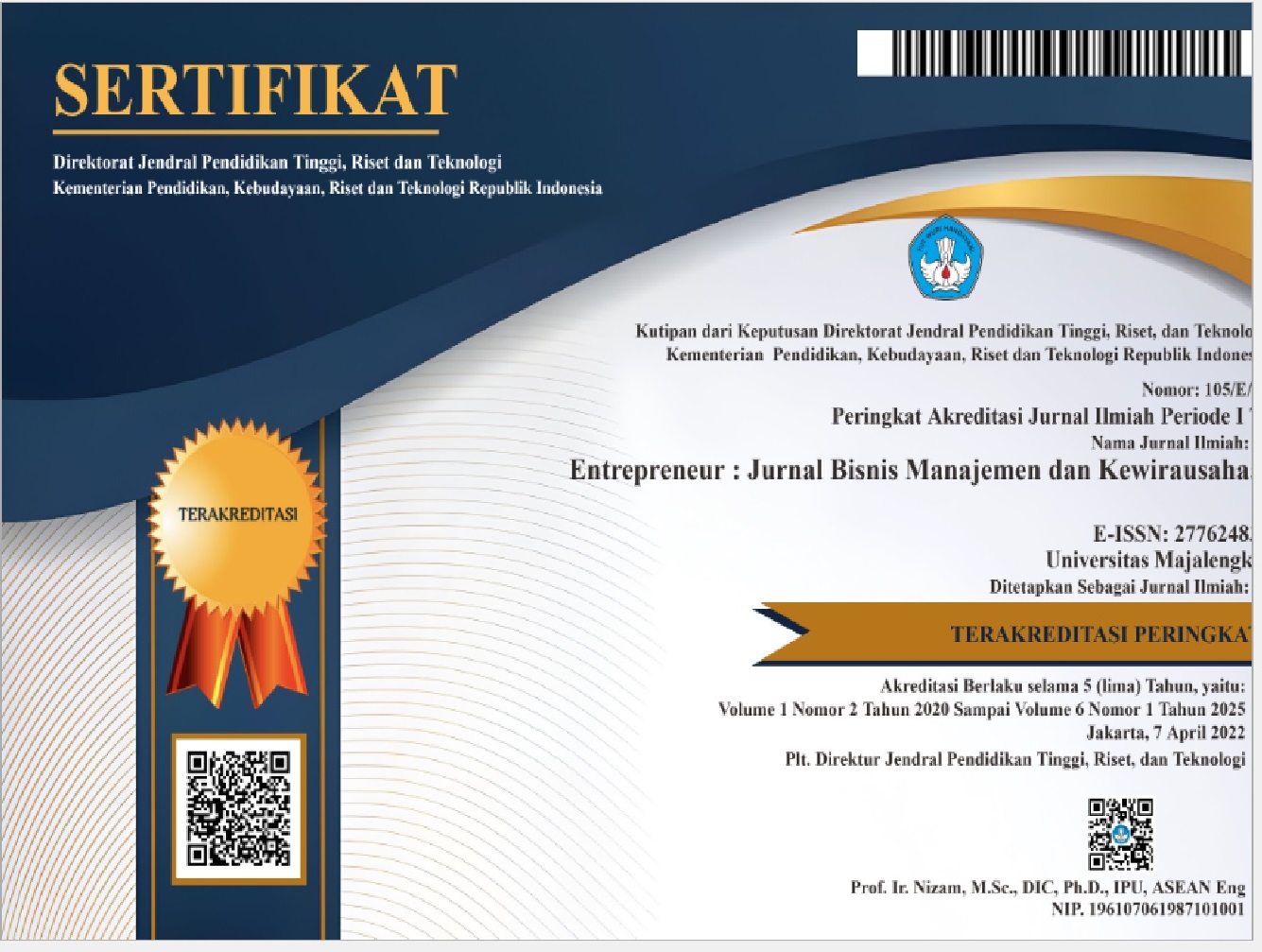Pengaruh Motivasi, Kompetensi Dan Budaya Kerja Terhadap Kinerja Guru Madrasah Ibtidaiyah Dengan Kepemimpinan Sebagai Variabel Moderating (Studi Kasus Pada Madrasah Ibtidaiyah se Kecamatan Ciawigebang Kabupaten Kuningan Jawa Barat)
DOI:
https://doi.org/10.31949/entrepreneur.v4i03.5713Abstract
Research objectives: 1)to determine the effect of work motivation on the performance. 2) to determine the effect of competence on the. 3) to determine the effect of work culture on the performance. 4) to find out whether leadership can moderate the relationship between work motivation and the performance. 5) to find out whether leadership can moderate the relationship between competence and the performance . 6) to find out whether leadership can moderate the relationship between work culture and the performance.
The study population was all private madrasa teachers in Ciawigebang District, Kuningan Regency, totaling 127 Madrasa teachers. The sampling technique uses a saturated sample. The data analysis method uses SEM analysis with the SmartPLS analysis tool.
The results of the study: 1) work motivation has a significant positive effect on teacher performance. 2) competence has a significant positive effect on teacher performance. 3) work culture has a positive and significant on teacher performance. 4) leadership cannot moderate the influence of work motivation on teacher performance. 5) leadership cannot moderate the influence of competence on teacher performance. 6) leadership is unable to moderate the influence of work culture on teacher performance.
Keywords:
Teacher Performance; Leadership; Work motivation; Competence; Work CultureDownloads
References
State Universities in Turkey. International Journal of Environmental and Science Education, 11(5), 931–948.
Peraturan Menteri Pendidikan Nasional Nomor 13 Tahun 2007 tentang Standar Kepala Sekolah/Madrasah.
Prasetyo, I. (2021). Kompetensi komunikasi kepala sekolah dalam meningkatkan kinerja guru smk kartika di balikpapan. Jurnal Manajerial Bisnis, 4(3), 174-189. https://doi.org/10.37504/mb.v4i3.323
Rukmana, A. (2018). Pengaruh Gaya Kepemimpinan Kepala Sekolah Dan Motivasi Kerja Guru Terhadap Prestasi Kerja Guru DI SMP N 1 Bayang. Jurnal Ekonomi & Pendidikan, (1), 77–93.
Rusydi, I., Rosyad, A. M., Ibnudin, Kambali, & Suratno, U. (2019). School Culture Program: Inculcating Anti Corruption Values Through Honesty Canteen In State Elementary School. International Journal of Psychosocial Rehabilitation, 24(4), 5362–5378.
Sadiman. 1992. Interaksi dan Motivasi Belajar Mengajar: Pedoman bagi Guru dan Ca- lon Guru. Jakarta: CV Rajawal.
Syno, J. L. S., McBrayer, J. S., & Calhoun, D. W. (2019). Faculty and Staff Perceptions of Organizational Units and Collaboration Impact. College Student Affairs Journal, 37(1), 1–13. https://doi.org/10.1353/csj.2019.0000
Tirtayasa, S. (2019). Pengaruh kepemimpinan, budaya organisasi, dan motivasi terhadap kinerja pegawai. Maneggio: Jurnal Ilmiah Magister Manajemen, 2(1), 45-54. http://dx.doi.org/10.30596%2Fmaneggio.v2i1.3367
Tunji Olusola Adeyemi. 2008. The Influence of Administrative Strategies on the Effective Management of Human Resources in Secondary Schools in Ondo State, Nigeria. Jurnal Internasional.
Umar, O. S., Kenayathulla, H. B., & Hoque, K. E. (2021). Principal Leadership Practices and School Effectiveness in Niger State, Nigeria. South African Journal of Education, 41(3), 1–12.
Wahjosumidjo. (1987). Kepemimpinan dan Motivasi. Jakarta: Ghalia Indonesia
Published
How to Cite
Issue
Section
License
Copyright (c) 2023 Fahmi1993 Fahmi Zakariya Al Anshori, Dikdik Harjadi, Dede Djuniardi

This work is licensed under a Creative Commons Attribution-ShareAlike 4.0 International License.
COPYRIGHT NOTICE
An author who publishes in the Entrepreneur: Jurnal Bisnis Manajemen dan Kewirausahaan agrees to the following terms:
1. Author retains the copyright and grants the journal the right of first publication of the work simultaneously licensed under the Creative Commons Attribution-ShareAlike 4.0 License that allows others to share the work with an acknowledgment of the work's authorship and initial publication in this journal
2. The author is able to enter into separate, additional contractual arrangements for the non-exclusive distribution of the journal's published version of the work (e.g., post it to an institutional repository or publish it in a book) with the acknowledgment of its initial publication in this journal.
3. The author is permitted and encouraged to post his/her work online (e.g., in institutional repositories or on their website) prior to and during the submission process, as it can lead to productive exchanges, as well as earlier and greater citation of the published work








